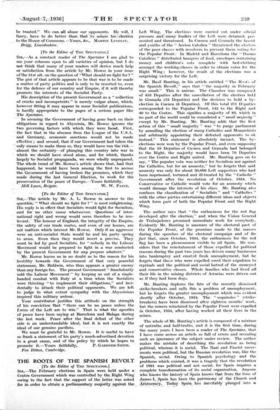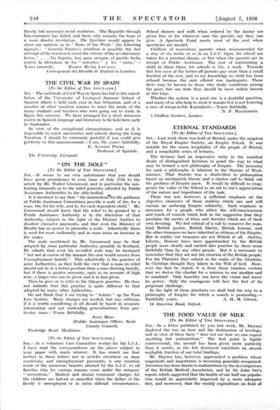THE ROOTS OF THE SPANISH REVOLT
. [To the Editor of THE SPECTATOR.] Sin, —The February elections in .Spain were held under a' Centre. Government which was controlled .by the. Right. Wing owing to the fact that .the support of the latter was asked for in:order to obtain a parliamentary. majority ,againd the Left Wing. _ The elections were carried out under official -pressure and; funny leaders'- of the Left were detained, per- secuted and threatened. In Cuenca and Granada the fascist and youths of the " Accion Caitolica " threatened the electors of the poor classes with revolVers to prevent them voting for the Popular Froth.' In Madrid and Barcelona the " Dainas Catolicas " distributed hampers of food, envelopes containing money and children's cots complete with bed-clothing amongst the working-classes in order to obtain votes for the Right Wing ; however, the result of the elections was a
.surprising victory for the Left. .
Mr. Basil Bunting, in his article entitled " The Roots of the Spanish Revolt," says that " the majority in February was small." This is untrue. The Chamber was composed of 453 Deputies after the cancellation of the election held in Granada (13 Deputies) and the decision to hold a by- election in Cuenca (6 Deputies). Of this total 271 Deputies corresponded to the Popular Front, 142 to the Right and 40 to the Centre. This signifies a majority of 89, which in no part of the world could be considered a " small majority" except by Mr. Bunting. Mr. Bunting adds that the first action of this " small majority " was to purge, parliament by annulling the election of many Catholics and Monarchists and arbitrarily appointing their defeated opponents to sit instead." This statement is absolutely inexact. The by- elections were won by the Popular Front, and even supposing that the 19 Deputies of Cuenca and Granada had belonged to' the Right, the majority would have been 70 Deputies over the Centre and Right united. Mr. Bunting goes on to say, "The popular vote was neither for Socialism nor against the Catholics, but for an amnesty," but he forgets that said amnesty was only for about 30,000 Left supporters who had been imprisoned, tortured and ill-treated by the " Catholic " Government after the revolution of October, 1984. • No Conservative or Catholic -would vote for an amnesty which would damage • the interests of his- class. Mr. Bunting also confuses the classification of " Socialists " and " Catholics " with the other parties entertaining different ideas and objects which form part of both the Popular Front and the Right Wing.
The author says that " the enthusiasm for the red flag developed after the election," and when the 'Union General de Trabajadores promised immediate work for everybody. Evidently Mr. Bunting is unaware of the electoral pact of the Popular Front, of the promises made to the masses during the speeches of the electoral campaign and of the fact that, since October, 1934, the enthusiasm for the red flag his been a phenomenon visible to all Spain. He con- siders that the reinstatement of those expelled for political reasons during the past two years has driven many businesses into bankruptcy and created fresh unemployment, but he forgets that those who were expelled owed their expulsion to reprisals and the political and social hatred of the moneyed and conservative classes. Whole families who had lived all their life in the mining districts of Asturias were driven out as if they had been dogs.
Mr. Bunting, deplores, the fate of the recently dismissed strike-breakers and calls this a problem of unemployment, but he forgets the greater unemployment which was evident
shortly after October, 1934. The esquiroles " (strike- breakers) have been dismissed after eighteen months' work, but the miners reinstated by the POpular Front were expelled in October, 1934, after having worked all their lives in the mines.
The whole of,Mr. Bunting's article is- composed of a mixture of untruths .and half-truths, and it is the first time, during the many years I have been a reader of The Spectator, that I have come across an article so full of errors and revealing such an ignorance of the subject under review. The author makes the mistake of describing the revolution as being political, whereas .it is social. The Nazi and Fascist move- ments were political, hut the Russian revolution was, like the Spanish, social. Owing to Spanish psychology and the problems which existed,.it was a tragedy that the revolution of 1931 was political and not social, for Spain requires a complete transformation -of its social organisation. Anyone who Ithovis the history-of Spain knows that from the time of James I,. Spain has been, the patrimony of the Church and .. .4ristoco.icy. Today Spain. has inevitably plunged into a bloody but necessary social revolution. The Republic through lukewarmness has failed, and there only remains the hope of a more drastic revolution. The Spectator would appear to share my opinion, as in " News of the Week" the following appears : " General Franco's rebellion is possibly the last attempt of the reaction to resist the victory of the revolutionary forces." . . . En Espana, hoy para siempre, el pueblo lucha contra la dictadura de los " sefioritos " y los " curas."—







































 Previous page
Previous page